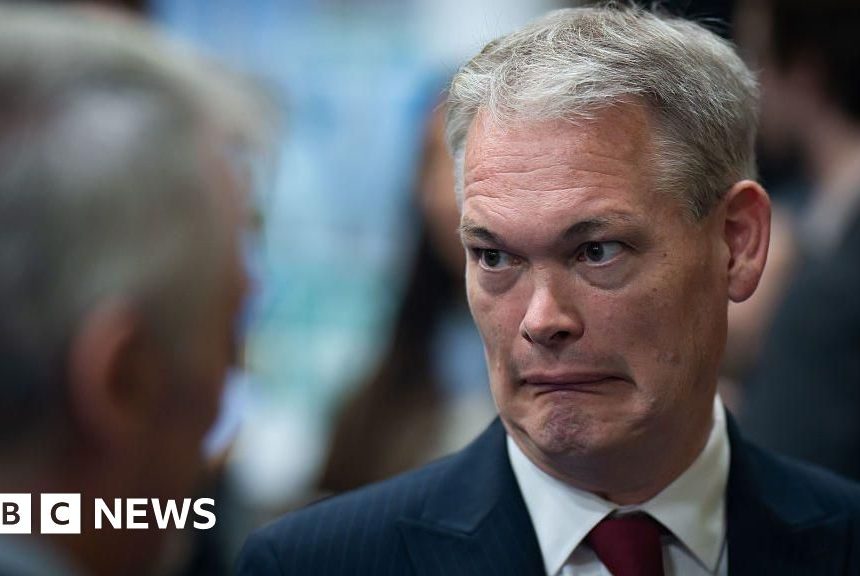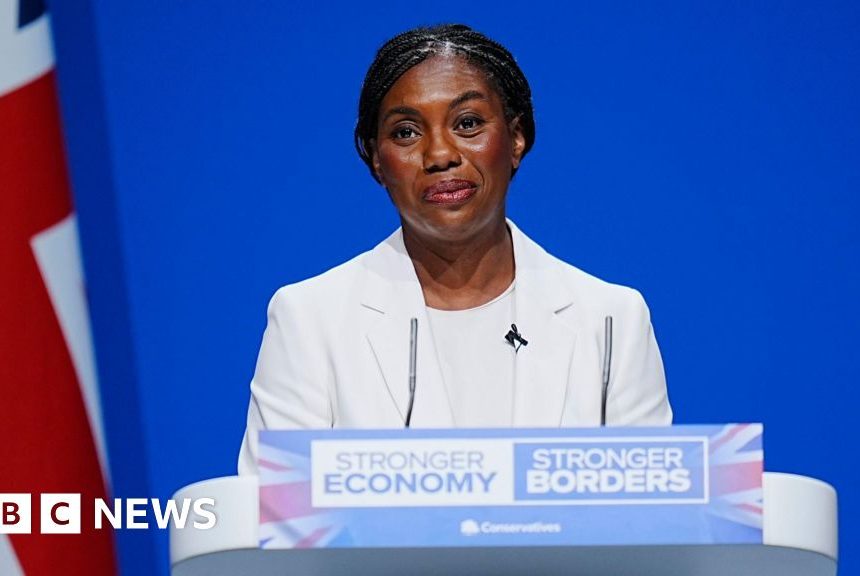Daniel Davies,BBC Wales political correspondent and
David Deans,BBC Wales political reporter
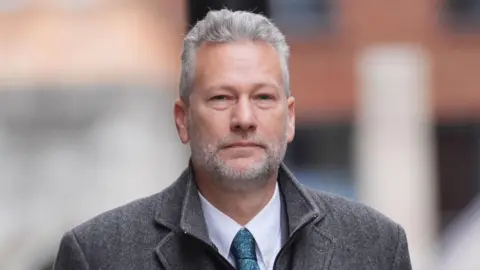 PA Media
PA MediaWhatsApp messages have revealed how a prominent MEP for Nigel Farage’s Brexit Party took bribes as part of a pro-Russian influence campaign in the European Parliament.
Nathan Gill, who went on to become leader of Reform UK in Wales, is facing prison for taking money from an alleged “pawn” of the main security agency in Vladimir Putin’s Russia.
Gill was paid thousands of pounds to give TV interviews in favour of a key Putin ally and to make speeches in the European Parliament between December 2018 and July 2019.
The 52-year-old father-of-seven has admitted eight counts of bribery and will be sentenced at the Old Bailey on Friday.
Prosecutors found WhatsApp chats between Gill and a Ukrainian called Oleg Voloshyn, a former member of the Ukraine Parliament for a pro-Russian party.
Gill, an MEP for six years, was also paid to host Putin’s most trusted associate in Ukrainian politics at the parliament in Strasbourg.
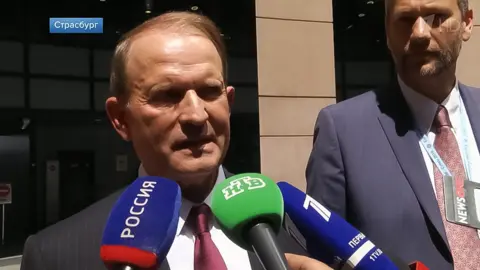 Channel One Russia
Channel One RussiaCounter terror police, who stopped Gill before boarding a plane to Moscow in 2021, found a message on Gill’s phone which said he would be “fairly rewarded” for organising the event.
Scotland Yard accused Gill of “peddling narratives… beneficial towards Russian interests”. Gill pleaded guilty to eight counts of bribery in September.
Farage, now leader of Reform UK, said he was “stunned” that Gill, a former Mormon bishop would have done this.
Farage said he had no knowledge of his “shameful activities” and condemned them “in every possible way”.
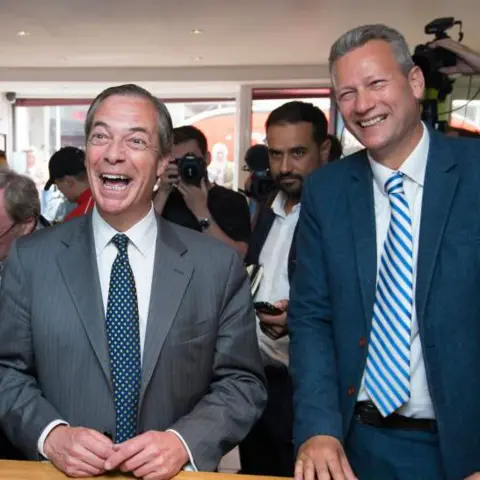 Getty Images
Getty ImagesGill was first elected as an MEP for the now defunct UK Independence Party in 2014 and rose through its ranks.
He led UKIP in Wales and was also elected to the Welsh Parliament in 2016.
Gill played a prominent role in the Brexit campaign in Wales and was one of only two MEPs who followed Farage from UKIP into the Brexit Party in 2019.
He had previously told the BBC he had responsibility for The Brexit Party’s group of MEPs as its “head of delegation”. He said that meant he told them where to sit and would “keep them in line”.
His WhatsApp chat history reveals that by this point, Voloshyn had helped prepare two of Gill’s contributions to parliamentary debates in December 2018 and March 2019.
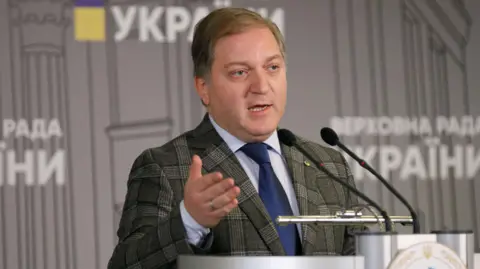 UNIAN
UNIANGill had visited Ukraine in May 2018 and was with Voloshyn at an event to commemorate the Soviet Union’s victory over Nazi Germany in World War Two.
That was four years after Putin’s forces had annexed Crimea while Russia were also supporting separatists fighting in Ukraine’s Donbas region.
Russia’s full-scale invasion of Ukraine happened in 2022.
That trip to Ukraine – the first of three in 2018 – was arranged by a Polish man called Janusz Niedźwiecki, who is awaiting trial in Poland on charges of spying for Russia.
While Gill deepened his connections in Ukraine, his ties to UKIP frayed and in December 2018 he followed Farage out of the party.
Prosecutors say he committed his first offence around this time – and that Voloshyn used the codewords “xmas gifts” and “post cards” to refer to cash in WhatsApps to Gill.
In return for the bribe, Gill read from a script in a European Parliament debate, where he raised concerns about threats in Ukraine to close two TV channels – 112 Ukraine and NewsOne.
Both were connected to a man called Viktor Medvedchuk, a super-rich Ukrainian oligarch whose daughter has Putin as her godfather.
Gill had visited the TV channels with fellow MEPs David Coburn and Jonathan Arnott in October 2018, both of whom spoke up for the broadcasters in the same debate as Gill.
Coburn and Gill were on an “international editorial board” for 112, together with Voloshyn.
Arnott said if Gill had offered him money, he would have gone to the police.
He also said he criticised Russia in his speech.
“I find the very suggestion that when I’m criticising Russia, that somehow I’ll be in any way reacting to something Russia would have wanted me to do… it’s provably nonsensical,” Arnott told the BBC.
The TV stations were threatened with closure, Arnott said and added that Gill told him “it was a freedom of speech issue”.
The BBC has tried contacting Coburn, the former UKIP leader in Scotland, but has not received a response.
Over the course of seven months in 2018 and 2019, Gill and Voloshyn shared WhatsApp messages to arrange payment.
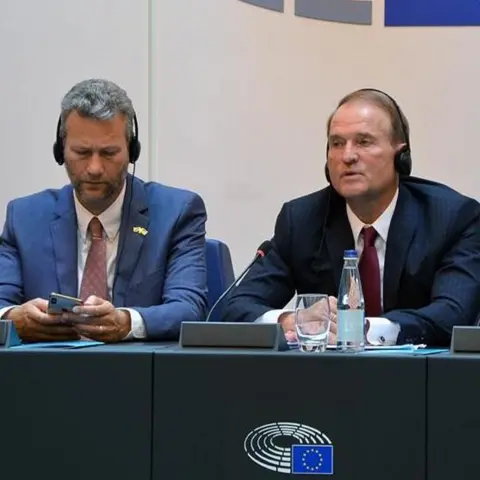 Facebook
FacebookIn emails with the BBC, Voloshyn said Gill was getting paid as part of an “advocacy campaign” and that he was “helping the opposition TV stations to fight for survival”.
One of Gill’s eight offences involved arranging a meeting with Medvedchuk, which was broadcast on Kremlin-controlled TV, at the European Parliament in July 2019.
Medvedchuk presented a so-called peace plan that involved talks between the Kyiv government and Russian-backed separatists who then controlled parts of Ukraine.
Some were payments for making supportive statements about Medvedchuk to 112.
On two occasions he was asked to get other MEPs, who have not been named by the prosecution, to do the same.
Voloshyn promised combined payments of at least €10,000 (about £8,600) for the favour.
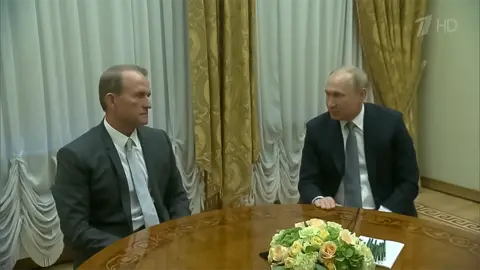 Channel One Russia
Channel One RussiaTwo of those present at Medvedchuk’s Strasbourg meeting were Brexit Party MEPs Rupert Lowe and James Wells.
Lowe said Gill had asked “me and other MEPs to attend” an event with a “very pro-Russian slant”.
“Due to his position in the grouping, I agreed,” added Lowe, now an independent MP who had a public falling out with Farage.
Lowe said he had no idea of Gill’s bribery, calling it “treasonous”.
Wells said he was angry with Gill because he felt he had been “using people around him, like me I guess, to put bums on seats”.
The former Welsh MEP said he “left probably after half an hour, because I didn’t know why I was there” and added the event now sounds “dodgy as hell”.
“I had no idea whatsoever that there was any money changing hands,” added Wells, who said he visited Ukraine with Gill in 2020.
“He’s not just risked the reputation of colleagues and the party but also the whole Brexit thing. It ties into the conspiracy that it was all about Russia… which is just a load of nonsense.”
After Russia’s invasion of Ukraine in 2022, Medvedchuk was captured by the Ukrainians and swapped with Moscow in a prisoner exchange.
It is thought Voloshyn, elected to Ukraine’s Parliament as a member of the pro-Russian Opposition Platform – For Life party in 2019, left the country for Belarus.
In his emails with the BBC, Voloshyn insisted Russia was not involved in the Gill case.
“We never reported to anyone in Moscow or were ever asked from there about anything related to our co-operation with Gill,” Voloshyn wrote.
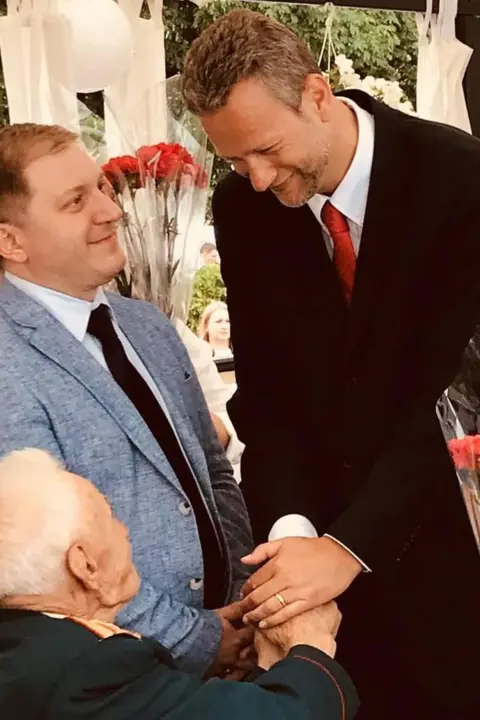 Telegram
TelegramVoloshyn said his phone was examined when stopped by FBI investigators at Washington DC’s Dulles Airport in July 2021.
That month, the Speaker of the House of Commons warned MPs against talking to Voloshyn and Niedźwiecki as both allegedly had sought the support of UK politicians to “promote Russian foreign policy objectives”.
The US government sanctioned Voloshyn in 2022 and called him a “pawn” of the FSB, Russia’s security service, and accused him of undermining Ukraine’s government.
That same year, the UK government also sanctioned Voloshyn and Medvedchuk, accusing both of “destabilising Ukraine”.
Anton Shekhovstov, an academic expert in Russian influencing campaigns, told the BBC that Voloshyn and his wife were active in building European networks for Medvedchuk.
He said the strategy of getting MEPs to defend the pro-Russian TV channels was effective and the investment in Gill “returned with profit”.
Shekhovstov said when Gill was asked to speak up for them in 2018, they’d become “instruments of Russian or pro-Russian propaganda”.
“President Petro Poroshenko at that time did not dare to sanction the channels,” said Shekhovstov.
The channels were shut in 2021 under the presidency of Ukraine’s current leader Volodomyr Zelensky.
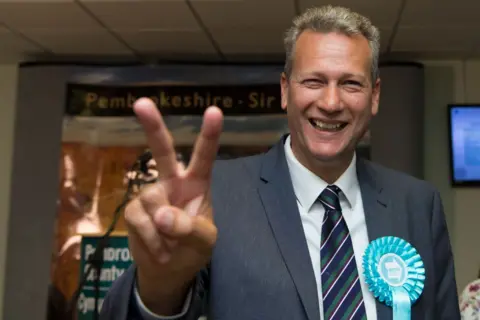 Getty Images
Getty ImagesGill invited Farage to Ukraine in 2019, but he declined.
“I said ‘you must be off your rocker’,” Farage told the BBC earlier this year.
“I said it’s one of the most corrupt countries on Earth.”
Voloshyn also said Farage had “absolutely nothing to do with it”.
“I never met him in my life and never passed any greetings, let alone requests,” he said.
Voloshyn’s wife Nadia Sass was photographed with Farage outside the European Parliament, but all involved say it was a one-off.
“Nigel Farage meets thousands of people every single year,” said a Reform UK spokesman.
“Many hundreds of them will ask to have a photo taken with him.”
In a recent interview, Farage said accusations that he is soft on Russia are “just nonsense”, added Putin was a “really bad dude” and said he would have Russian jets shot down if they entered Nato airspace.
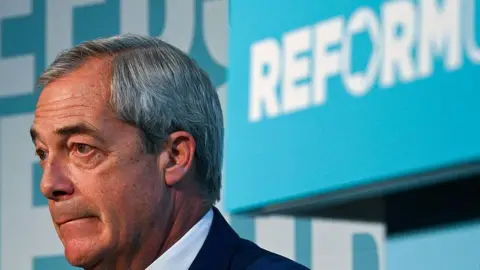 Getty Images
Getty ImagesLord Beamish, chairman of the parliamentary intelligence and security committee, said the problem of Russian meddling is “constant” and that the Gill case was “not unusual”.
“There are other examples in Europe where similar things have happened”, he said.
“It’s not just the UK.”
A Russian-based “propaganda” network allegedly paying unnamed European politicians, called Voice of Europe, was shut down in the Czech Republic last year.
Medvedchuk was accused of being behind it.
The head of the Met’s counter terrorism unit said Gill’s case “goes to the heart of our democratic values”.
“We will not hesitate to investigate and disrupt anyone seeking to harm or undermine these values and our national security,” said Commander Dominic Murphy.
The BBC went to Gill’s home in Llangefni on Anglesey for a comment but he declined.

